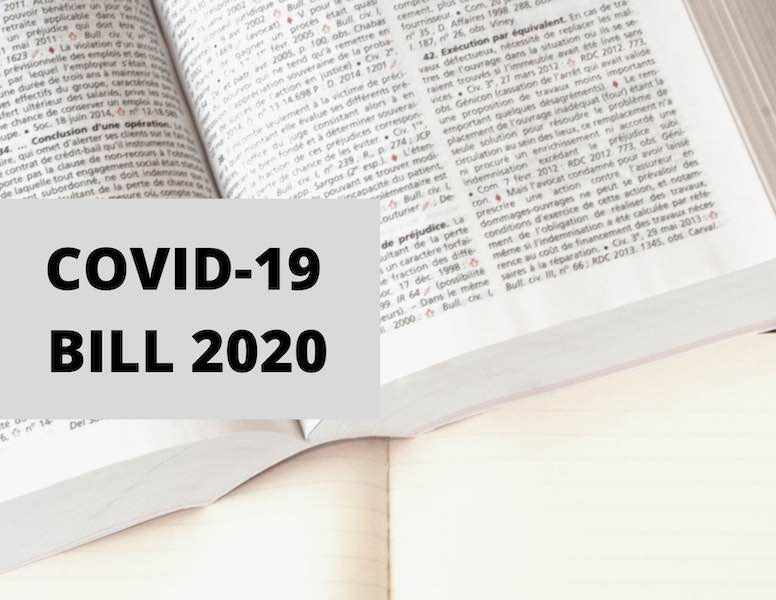COVID-19 Bill 2020 – Protection Against Inability to Perform Contractual Obligations
by Mavinthra Jothy Thillainathan ~ 25 August 2020


Lavinia Kumaraendran (Partner)
Tel: 603-6201 5678 / Fax: 603-6203 5678
Email: lkk@thomasphilip.com.my
Website: www.thomasphilip.com.my

Mavinthra Jothy Thillainathan (Senior Associate)
Tel: 603-6201 5678 / Fax: 603-6203 5678
Email: mjt@thomasphilip.com.my
Website: www.thomasphilip.com.my
On 12 August 2020, the Temporary Measures For Reducing The Impact Of Coronavirus Disease 2019 (COVID-19) Bill 2020 (“COVID-19 Bill”) was tabled for its first reading in the lower house of Parliament. Whilst many have criticised the delay in the tabling of the COVID-19 Bill, saying that it will result in a lack of protection for those who were affected by the movement control order (MCO), it is undeniable that for many others, the anticipated passing of this piece of legislation has come in their hour of need. By and large, Malaysia’s COVID-19 Bill is similar to what has been implemented in other commonwealth countries such as Singapore and New Zealand. Whilst the COVID-19 Bill addresses various matters including modifications to existing laws, this write up will focus on a particular aspect of the bill namely, Part II which is titled “Inability to Perform Contractual Obligation”. It addresses the protection afforded to parties arising out of their inability to perform existing contractual obligations as a result of the COVID-19 pandemic.
The starting point is Clause 5 of the COVID-19 Bill which provides that Part II is deemed to have come into operation on 18 March 2020 and shall continue to remain in operation until 31 December 2020. In short, this bill if passed as law, will have a retrospective effect. It is crucial to note that the relevant Minister in charge does have the power to enlarge the aforementioned period from time to time if the need to do so arises.
Clause 7 which is the centrepiece of the COVID-19 Bill, in essence, restrains parties from exercising their strict contractual rights against counterparties who are unable to perform their contractual obligations during the aforementioned period. However, before such relief may be triggered, the contractual obligation(s) in question must arise from one of the scheduled categories of contracts and the inability to perform the same must be due to the measures prescribed under the Prevention and Control of Infectious Diseases Act 1988 to control or prevent the spread of COVID-19. These categories of contracts which are set out in the Schedule to Part II of the Covid-19 Bill are as follows:
- Construction work contract or construction consultancy contract and any other contract related to the supply of construction material, equipment or workers in connection with a construction contract.
- Performance bond or equivalent granted pursuant to a construction contract or supply contract.
- Professional services contracts.
- Lease or tenancy of non-residential immovable property.
- Event contract for the provision of any venue, accommodation, amenity, transport, entertainment, catering or other goods or services including amongst others:
- Business meeting;
- Conference;
- Exhibition;
- Concerts;
- Weddings;
- Sporting event.
- Contract by a tourism enterprise and a contract for the promotion of tourism.
- Religious pilgrimage-related contracts.
What this means is that at any time between 18 March 2020 and 31 December 2020, if Party A is unable to perform a particular obligation under the contract (eg: failure to deliver goods outside Malaysia, which has been rendered impossible due to the closing of the Malaysian borders since 18 March 2020), Party B will be prevented from exercising its strict contractual rights against Party A arising from Party A’s failure to perform the contract. In other words, Clause 7 imposes a temporary moratorium on a party to a contract from taking legal action against the non-performing party during the aforementioned period.
On the other side of the coin lies the question of what remedy is then available to contracting parties who have inevitably suffered some form of loss or damage as a result of the other party’s inability to perform the contract? The answer to that quandary lies in Clause 9 of the COVID-19 Bill which provides that any such dispute may be settled by way of mediation. The bill provides that the Minister in charge may determine the mediation process and upon the conclusion of the mediation, if the parties are able to come to an agreement, they shall enter into a binding settlement agreement in writing.
Arguably the biggest criticism of the COVID-19 Bill in this regard is that the relief afforded by Clause 7 appears to be diluted by the savings provision found in Clause 10. A ‘savings’ provision is a clause in a statute which exempts something from the statute's operation. Clause 10 provides that any contract terminated, any deposit or performance bond forfeited, any damages received, any legal proceedings commenced and any judgment or awarded granted where execution thereto is carried out for the period from 18 March 2020 until the coming into force of the COVID-19 Bill, shall be deemed to have been validly terminated, forfeited, received, commenced, granted or carried out.
What this means, therefore, is that Clause 10 is likely to cause a spate of actions being filed in court by parties seeking to circumvent this law by terminating contracts, forfeiting deposits or commencing legal proceedings before the coming into force of the Act. These actions will therefore not be susceptible to challenge given the meaning and effect of Clause 10.
As it stands, the COVID-19 Bill is not expected to come into force until probably sometime in late September or early October 2020. The bill must first make its way past the second and third readings in the lower house before it is passed by the upper house of Parliament, receives Royal Assent and is finally gazetted by the Minister in charge. It remains to be seen whether this piece of legislation will meet its intended purpose.